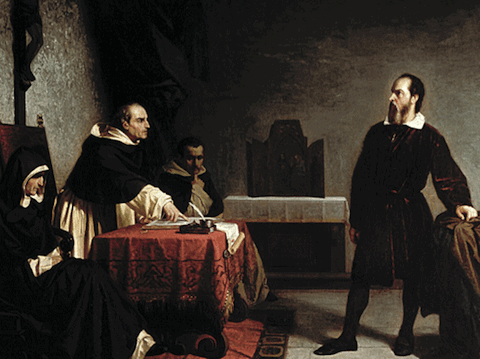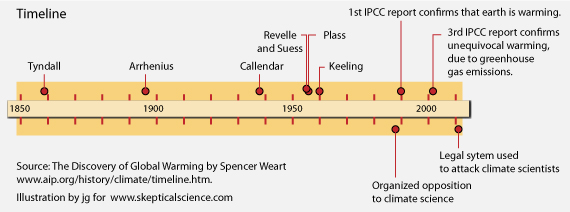Modern scientists, following in Galileo’s footsteps
Posted on 29 September 2011 by Tom Smerling
This blog post also serves as the Intermediate Rebuttal to the climate myth Climate 'Skeptics' are like Galileo. The short URL for this rebuttal is http://sks.to/galileo
Some climate change skeptics compare themselves to Galileo, who in the early 17th century challenged the Church’s view that the sun revolves around the earth and was later vindicated.
The comparison to Galileo is not only flawed; the very opposite is true.

1. Galileo was suppressed by religious/political authority, not scientists. Galileo was not suppressed or “outvoted” by other early scientists. Many scientific contemporaries agreed with his observations[2], and were appalled by his trial.[3] Galileo was persecuted by the religious-political establishment – the Catholic Church, which in 1616 ordered him to stop defending his view of the solar system, which contradicted church dogma. After Galileo published his famousDialogue, the Roman Inquisition tried him in 1633 for defying Church authority, and found him guilty of suspected religious heresy, forced him to recant, banned his books and sentenced him to house arrest for life.[4] Galileo died eight years later.[5]
2. Science is evidence-based; the most vocal skeptics are belief-based. The key difference between Galileo and the Church concerned Galileo’s “way of knowing,” or epistemology. How is knowledge attained?
Medieval scholarship and Catholic Church dogma relied on the authority of Aristotle and a literal interpretation of the Bible to place earth at the center of the universe.
In contrast, Galileo’s views were not based on an infallible authority. His conclusions flowed from observations and logic. Galileo’s evidence- and logic-based method of inquiry later became known as the scientific method.
The vast majority of vocal skeptics are not engaged in climate research. The common bond uniting them, observers note, is an ideological belief system: Government regulation is bad, so problems that may require regulation must be resisted.[6] From there, they search for ways to cast doubt on the science.[7] Unlike Galileo and modern scientists, they do not change their view when presented with new evidence, because their position derives not from open-ended scientific inquiry, but from strongly-held ideological convictions.
In contrast, climate science applies the scientific method pioneered by Galileo. Scientists make observations, form logical hypotheses, then test their hypotheses through experiments and further observations. They follow the evidence wherever it leads.
The Church’s attack on Galileo and the skeptical assault on climate science are far from unique. History is full of examples where new scientific findings threatened powerful vested interests – whether religious, financial or ideological -- and provoked a furious backlash.
3. The discovery of global warming overturned an age-old belief; the skeptics seek to restore it. In arguing that the planets revolve around the sun, Galileo was challenging an idea that had dominated Western thought for over 1400 years. Ever since Ptolemy (90-168 AD) codified Aristotle’s “geocentrism,” most philosopher/scientists had accepted the common sense view that the earth is the center of the universe, with the sun and planets revolving around us.
Similarly, the prevailing view throughout history was that people, through our own actions, could not possibly alter earth’s climate on a global scale. Even into the 20th century, the overwhelming majority of scientists maintained, in science historian Spencer Weart’s words,
the widespread conviction that the atmosphere was a stable, automatically self-regulated system. The notion that humanity could permanently change global climate was implausible on the face of it, hardly worth a scientist's attention.[8]
Some say climate science’s first “Galileo moment” came in 1896, when Swedish scientists Svante Arrhenius, after years of laborious hand calculations, predicted eventual global warming due to CO2 emissions.[9] Others point to 1938, when a British steam engineer named Guy Stewart Callendar, after poring over old CO2 and temperature records, stood alone before the Royal Meteorological Society to argue that global warming was already happening.[10]
Arrhenius and Callendar were ahead of their time, and failed to persuade others. In both cases, the scientific establishment found their calculations oversimplified and their evidence incomplete, certainly not convincing enough to overturn the ancient view that global climate was impervious to human acts.
Mainstream scientific opinion was slow to change. During the post-war science boom in the 1950’s, early computers and advanced methods allowed scientists to directly investigate objections to Arrhenius’ and Callendar’s view.[11] Using the new digital computers, Gilbert Plass found that more CO2 could indeed block more heat.[12] Hans Suess analyzed radioactive isotopes to detect ancient carbon in the air, presumably from fossil fuels.[13] Roger Revelle and Suess discovered that the oceans could not quickly take up additional CO2. David Keeling built the first sensor capable of accurately measuring atmospheric CO2 – just as Galileo had invented a more advanced telescope – and found that the CO2 level was indeed rising.
From 1960 to 1990, the evidence kept accumulating, from areas of study as far afield as geology, astronomy and biology. As the gaps in knowledge were filled, one-by-one, most scientists changed their views and gradually formed a new consensus: significant anthropogenic (human caused) global warming was likely.[14]
By 2000, the evidence was overwhelming.
The hypothesis proposed by Arrhenius in 1896—denied by almost every expert through the first half of the twentieth century and steadily advancing through the second half—was now as well accepted as any scientific proposal of its nature could ever be.[15]
The climate pioneers were vindicated.

Critics of climate science, backed by the alarmed fossil fuel industry,[16] sprang into action in the late 1980s, when the mounting evidence led to calls for international action to limit CO2 emissions. They did not argue, like Galileo, for a revolutionary hypothesis based on new evidence, because they could not agree on one among themselves.[17] They produced little new evidence. Instead, they searched for flaws in others’ research, and launched a public relations campaign to sow public doubt.
Unlike Galileo, climate skeptics were not trying to overturn an ancient view. Their goal was the opposite: to restore the age-old conventional wisdom, that, by itself, “human activity was too feeble to sway natural systems”[18]. In clinging to this old view, the skeptics' stance more closely resembles that of the Catholic Church, which fought Galileo’s views for another 100 years after the scientific establishment had embraced him.
4. Climate scientists, not skeptics, are being dragged into court Armed with ideological certainty, backed by powerful financial and political interests, skeptics have sought to not only discredit the science but impugn the researchers’ honesty. Unfounded accusations of deception and conspiracy fly freely,[19] and some climate scientists even receive death threats.[20] These attacks, according Dr. Naomi Oreskes, “have had a chilling effect... Intimidation works.”[21]
In April 2011, personal attacks on scientists took a more ominous turn, when Virginia’s Attorney General Ken Cuccinelli, a fierce climate skeptic, launched a criminal fraud investigation of a prominent climate scientist, Dr. Michael Mann.[22] Multiple investigations by independent scientific bodies have found no trace of wrongdoing in Mann’s work, and a Virginia judge dismissed Attorney General’s subpoena request for lack of evidence. Yet, as of September 2011, Cuccinellis’ crusade continues.[23]
If Galileo were alive today, watching climate scientists being dragged into court on baseless charges, is there any doubt whose side he would take?
[1] On Sept 7, 2011, at the Republican presidential debate in Simi Valley, Texas Gov.. Rick Perry, became the highest level politician to invoke the Galileo comparison.
Well, I do agree that there is -- the science is -- is not settled on this. The idea that we would put Americans' economy at -- at -- at jeopardy based on scientific theory that's not settled yet, to me, is just -- is nonsense. I mean, it -- I mean -- and I tell somebody, I said, just because you have a group of scientists that have stood up and said here is the fact, Galileo got outvoted for a spell.http://www.nytimes.com/2011/09/08/us/politics/08republican-debate-text.html?pagewanted=all
The founders of Australia’s “Galileo Movement” claim that global warming is a “fabrication,” and
cite as inspiration Galileo Galilei, the 17th century astronomer and father of modern science, who challenged the dogma of the Roman Catholic Church to report the Earth orbited around the sun. http://www.scientificamerican.com/article.cfm?id=galileo-movement-fuels-australia-climate-change-divide
[3] personal communication, Spencer Weart, 9-17-2011.
[4] Wooton, David. Galileo: Watcher of the Skies, Yale University Press, New Haven (2010), p. 224-5.
[5] Galileo died on January 8, 1642 at age 77.
[7] See Oreskes, Naomi and Erik M. Conway. Merchants of Doubt, Bloomsbury Press, New York (2010)
[12] Dr. Spencer Weart’s excellent history of this period can be found in overview at http://www.aip.org/history/climate/summary.htm, with more details athttp://www.aip.org/history/climate/co2.htm, the linked timeline and other articles.
[13] Weart, Spencer. The Discovery of Global Warming, Harvard University Press, New York (2004), p. 26
[14] Weart, p. 164.
[15] Weart, p. 191.
[18] http://www.aip.org/history/climate/summary.htm
[19] Oreskes and Conway, page 4, 198-213. 264.
[20] http://www.theaustralian.com.au/news/nation/climate-scientists-angered-by-deniers-death-threat-campaign/story-e6frg6nf-1226079058193
[21] Oreskes and Conway, p. 264-5.
[22] http://www.washingtonpost.com/wp-dyn/content/article/2010/08/30/AR2010083005004.html?sid=ST2010050303477
[23]http://voices.washingtonpost.com/virginiapolitics/2010/07/the_university_of_virginia_hol.html Also see the Climate Science Legal Defense Fund: http://profmandia.wordpress.com/2011/09/09/donation/































 Arguments
Arguments























 0
0  0
0






Comments